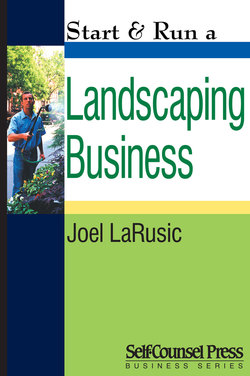Читать книгу Start & Run a Landscaping Business - Joel LaRusic - Страница 15
На сайте Литреса книга снята с продажи.
5. Insurance
ОглавлениеStuff happens, as they say, and insurance can protect you when that stuff happens. Be sure to speak to a professional about the type and amount of insurance you need. An oversight can be expensive. It may even cost you your business. Here are some of the types of insurance you’ll need to consider when you work for yourself:
• Vehicle insurance. It’s a given that you need vehicle insurance, but will you need special coverage? Who will drive the vehicle (just you, or staff members as well)? Do you require special commercial plates on the vehicle? Do you qualify for fleet insurance (when your business gets a little larger)? Note that in most cases only items that are “attached” to the vehicle are covered. Your vehicle insurance will likely not cover damage or theft of your equipment (see the paragraph on equipment insurance below).
• Liability insurance. When you start bidding on commercial properties, you will be asked to prove you have sufficient coverage to protect against things like injuries to bystanders and property damage.
• Equipment insurance. Your power equipment should be covered for loss by theft or fire. You may find it more difficult to find an insurer for your portable equipment because it’s so easy to steal. Keep looking, though, because such insurers are available. Consider saving money by having a high deductible (around $500). If you have a single piece of equipment stolen, don’t tarnish your record by claiming it; just buy a new one. On the other hand, if all of your portable equipment disappears, then $500 is a small price to pay to replace it.
• Personal disability insurance. In many small businesses, if the owner is out of action, the money stops coming in. You should have enough personal disability insurance to cover your business overhead and perhaps the cost of hiring a replacement so the work can go on. In most areas you can opt to have workers’ compensation coverage, but this will not apply if you are injured off the job.
• Life insurance. You probably already have life insurance, but you might want to review your coverage now that you plan to be self-employed. If you are supporting others, how will they be supported if you die prematurely?
• Medical insurance. Availability of supplemental medical insurance varies by jurisdiction. Be sure you are adequately covered.
• Home office insurance. Check to ensure that your current home insurance (theft, fire, etc.) will cover your home office. There may be a specific rider that excludes it.
• Business interruption insurance. This is designed to cover you for a period of time to allow recovery from disasters such as loss of premises or files.
• Employee benefits. Group insurance is available for even small companies. It is a great benefit and worth investigating.
